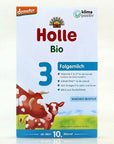
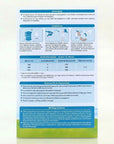
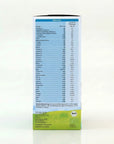
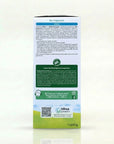
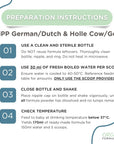
similar formulas
Holle Bio Stage 3
Premium European Organic Baby Formula

For ages
From: in 16-pack
Unit size:
Yields: of ready-made formula
+ FREE Shipping
BEST DEAL!
+ Canadian import duties according to this table
Holle Organic Stage 3
This Holle Organic Formula is a popular, additive-free organic formula tailored for infants 10 months and up. This simple and pure formula is thoughtfully crafted to serve as a complete and nourishing meal, free from unnecessary additives, and composed of only wholesome ingredients to support growing infant development. This can be either used a natural follow-on formula from Holle Bio Stage 2, or can be introduced to babies as a compliment to food and/or breastmilk.
Holle Bio Stage 3 is entirely GMO-free and is also available in Holle Bio Stage 4
follow-on variations.
Demeter Skim milk, Organic Whey Powder (Partly Demineralized), Organic Vegetable Oils [Organic Palm Oil, Organic Sunflower Oil, Organic Rapeseed Oil], Maltodextrin, Organic Lactose, Skimmed Milk Powder, Fish Oil, Calcium Carbonate, Potassium Chloride, Sodium Chloride, L-Tyrosine, Vitamin C, L-Tryptophan, Iron Lactate, Vitamin E, Zinc Sulfate, Vitamin A, Vitamin D, Niacin, Pantothenic Acid, Copper Sulfate, Vitamin K, Folic Acid, Vitamin B1, Vitamin B12, Vitamin B6, Manganese Sulfate, Potassium Iodate, Sodium Selenate, Biotin.
Your order will be processed within 2 business days and then promptly shipped out. All shipments are handled by UPS Express.
Shipping typically averages between 2-5 business days.
Please note that we are not responsible for any taxes and or duties that may be charged by the carrier before arrival at your destination.
similar formulas
WHY DO BABIES LOVE Holle Bio Stage 3 FORMULA?
A step above organic
Preparation
- IMPORTANT: Only use the scoop provided in the box.
- Clean and Sterilize everything (bottle, nipple and ring)
- Use freshly boiled water only
- Cool water to optimal mixing temperature at or below 122°F / 50°C
- Add desired amount of water to bottle using the volumes in the feeding table below.
- Add one unpacked scoop of formula for every of water.
- Shake well until dissolved and no lumps remain
- Cool to drinking temperature at or below 98.6°F / 37°C
- Happy feeding!
Care instructions
- Expiration date is indicated on each box in the European format DD/MM/YY
- Store formula powder in a cool, dry place. Do not refrigerate
- Keep airtight and use within 3 weeks
- Only use the scoop provided. Do not mix with anything else (such as other milk)
- Use the bottle of prepared formula within 1 hour
- If refrigerated, a prepared bottle of formula should be used within 2-12 hours
The amount of formula needed per month depends on your baby's eating habits, and whether or not formula is their primary source of food. Below you'll find a sample table for ages 0 - 12+ months based on a 600 g package of Holle Bio Stage 3 formula.
| Age | Water | Scoops | Formula Volume | Meals Per Day | Packs Needed |
| 0-3 Months | 90 ml (3 oz) | 3 | 100 ml (3.2 oz) | 5-7 | 7 / month |
| 3-6 Months | 120 ml (4 oz) | 4 | 135 ml (4.6oz) | 5-7 | 8 / month |
| 6-10 Months | 180 ml (6 oz) | 6 | 200 ml (6.7 oz) | 5-6 | 12 / month |
| 10-12 Months | 210 ml (7oz) | 7 | 235 ml (8 oz) | 3-4 | 9 / month |
| 12+ Months | 210 ml (8oz) | 7 | 235 ml (8oz) | 2-3 | 6 / month |
European Organic Farms

About Holle
your baby deserves the best

Frequently Asked Questions
-
WHEN TO SWITCH TO STAGE 3 FORMULA?
You should switch to Holle Stage 3 formula when your baby is around 10 months old. Holle Stage 3 is designed for infants aged 10 to 12 months and provides additional nutrients to support their growth and increased energy needs as they become more active and start eating a more varied diet. Signs that your baby may be ready for Stage 3 include reaching the 10-month mark, showing interest in solid foods, and needing more energy to support their developmental milestones like crawling or walking. Always consult with your pediatrician for personalized advice based on your baby's specific nutritional requirements.
-
WHAT IS THE DIFFERENCE BETWEEN HOLLE STAGE 3 AND 4?
The differences between Holle Stage 3 and Holle Stage 4 formulas primarily relate to their intended age ranges and nutritional content. Holle Stage 3 is designed for infants aged 10 months and up, providing balanced nutrition to support growth as babies become more active. It contains higher levels of vitamins and minerals compared to Stage 2, making it suitable for babies who are no longer satisfied with their regular formula. Holle Stage 4 is intended for toddlers aged 12 months and older. It is formulated to meet the nutritional needs of older children transitioning to solid foods. Stage 4 contains additional nutrients to support continued growth and development, including DHA and ARA for brain, eye, and neural development, as well as calcium and vitamin D for strong bones and teeth. Both stages are made from high-quality organic ingredients and are free from artificial additives, preservatives, and GMOs. It's important to note that neither Holle Stage 3 nor Stage 4 contains probiotics or prebiotics. The transition from Stage 3 to Stage 4 should be based on the child's age and nutritional needs, as recommended by a pediatrician.
-
WHY IS HOLLE NOT FDA APPROVED?
Holle formula is not FDA approved primarily due to differences in regulatory standards between the United States and Europe. While Holle meets stringent European safety and nutritional guidelines, these do not always align with those set by the FDA. The process for obtaining FDA approval can be costly and time-consuming, which may deter some companies from pursuing it, especially if they have a strong market presence in Europe. Additionally, the FDA has specific labeling requirements that Holle products must meet to be sold in the U.S., further complicating the approval process. Despite the lack of FDA approval, many parents choose to use Holle formula due to its organic credentials and positive reviews, although they should consult with healthcare professionals regarding their baby's nutritional needs and safety considerations.
-
DOES HOLLE CAUSE CONSTIPATION?
Holle formula can potentially cause constipation in some infants, especially during the transition from breast milk to formula. This is due to the thicker consistency and larger proteins in formula, which can be harder to digest, leading to firmer stools. While Holle formulas are crafted with high-quality organic ingredients aimed at promoting healthy digestion, individual responses may vary. Some parents have found that switching to Holle, particularly the Holle Goat Milk Formula, has helped alleviate constipation issues because goat milk proteins are gentler on the digestive system. If your baby experiences constipation while using Holle formula, it's advisable to consult a pediatrician for guidance on dietary adjustments or alternative formulas that may better suit your baby's needs.
-
WHY IS HOLLE FORMULA BETTER?
Holle formula is often considered better because it uses high-quality organic ingredients, including milk from grass-fed cows, ensuring it's free from harmful additives, antibiotics, and growth hormones. It closely mimics breast milk, providing a balanced mix of proteins, carbohydrates, and fats essential for healthy growth. Holle formulas are easy to digest and gentle on infants' stomachs, making them suitable for sensitive tummies. They also contain important vitamins and minerals, including DHA for brain development. Additionally, Holle adheres to strict European organic standards, ensuring safety and quality. These factors make Holle a trusted choice for many parents seeking nutritious options for their babies.










